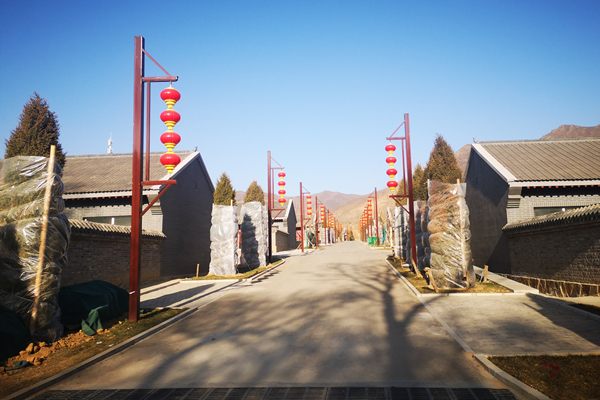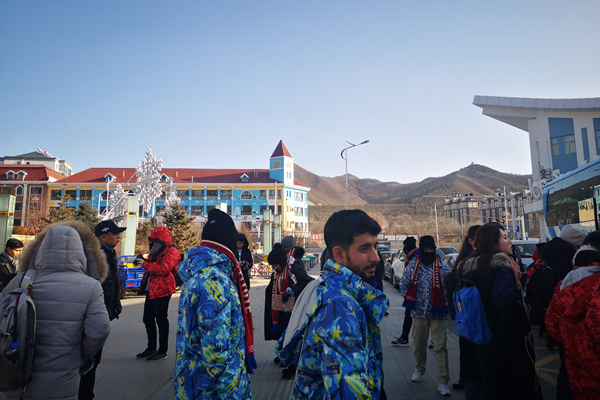Chongli rises fast in preparing for Winter Olympics
- By Zhang Jiaqi
 0 Comment(s)
0 Comment(s) Print
Print E-mail China.org.cn, November 22, 2019
E-mail China.org.cn, November 22, 2019

Though there is still over two years to go before the 2022 Beijing Winter Olympics, the improving ski resorts in Chongli, a district in north China's Zhangjiakou city hosting all skiing and biathlon events, already attract large numbers of Chinese and international visitors.
Ozobia Samuel Davies, public relations officer of Rokel Commercial Bank of Sierra Leone, was one of the 50 government officials and senior managers from 26 developing countries who visited the ski resorts and the district Nov. 18-22. Now studying in the International MBA Program at the Emerging Markets Institute of Beijing Normal University (BNU), these students from Africa, Asia, and North and South America were on a field research trip.
Sharing what he saw, Davies said Chongli was one of the least developed areas in China, but now, was obviously on the rise.
Shaking off poverty
Gao Junsheng, 60, lives in Shangwopu village here. He moved to a new steel-and-concrete house this April from an old adobe dwelling in which he had lived for 28 years.
Before 2010, even though Chongli was already a destination for skiers, it was still a nationally designated poor county of adobe houses and muddy roads. Now, they are replaced by residential buildings in urban areas and paved streets across the district.
After the successful 2015 bid of Beijing and Zhangjiakou to co-host the 2022 Winter Olympics, Chongli saw a big chance to develop itself, and sought more private capital in its construction.
Forlong Holdings is one of the private companies attracted to Chongli by its potential and has invested big. Besides developing hotels and a ski resort, the company also renovated Shangwopu village.
Gao is happy and grateful to get his new, safer, cleaner and brighter two-bedroom apartment for free. The second month his family moved in, he opened a grocery store in the gate house, which brings him a monthly net income of over 2,000 yuan (US$284).
Besides houses, the company also developed paved roads, a public restroom and a nursing home, as well as establishing a village committee to run affairs.
Now, the company is encouraging the villagers to develop their houses into homestay facilities, looking to develop a new industry in the village. In a spare warehouse in his yard, Gao has already set up a dining space for tourists. He had received a few people just days before the study group came.

Impressed by the engagement of private capital in poverty alleviation, Tshegofatso Modise, principal records officer of Botswana's Ministry of Local Government and Rural Development, said companies back in her own country should also be involved in activities reflecting social responsibility like the Chinese ones, to empower others while developing themselves.
With the targeted poverty alleviation efforts of the government and the engagement of private capital, the number of Chongli's poor population has fallen from 24,000 to just 37 over the past four years. And, while seniors come to enjoy better living conditions, the younger generation are also discovering the greater attractiveness of their hometown.
Heading fast forward
Working as a resort assistant of Forlong Holdings, Ma Bo followed the international group throughout their trip as a photographer. Ma decided to stay and work in his hometown after graduating from college this year, seeing its many working opportunities and great potential.
"For Chongli, the Winter Olympics mean development," he said.
Zhao Qiong also shared similar ideas when thinking through the development of Genting Resort Secret Garden, another ski resort in Chongli.
His company sent him to Chongli at the beginning of 2013 when the facility had been open less than three months. Finding Chongli a poor place with low temperatures and his locale too remote to receive delivery services, Zhao thought he had been left out in cold by the company. As the public relations officer, it was a headache for Zhao to encourage people to take skiing breaks there back then.

However, after the successful bidding of the Winter Olympics, the Genting Resort Secret Garden witnessed a big surge in its customer flow, with a year-on-year increase of 50%, while the district on the whole moved onto a fast developmental track.
With the Genting Resort Secret Garden selected as the official venue of the 2022 Winter Olympics freestyle ski and snowboard events, Zhao no longer had to struggle to promote it any more.
Statistics of Chongli's tourism authority shows the area received around 2.68 million people in the 2016-2017 ski season and gained revenue of 1.89 billion yuan, up 22.5% and 22.7% year-on-year.
Wang Sizhou, deputy secretary of Chongli's Party committee, said that, if there were no Winter Olympics, Chongli would have still developed like many places without such a benefit, but it would not develop as fast as it is now.
"The Winter Olympics offer a significant boost to the district's development," he said.
According to Zhao, Chongli is now struggling to fill all its job vacancies from local resources, and has to hire more people from the entire Zhangjiakou city; the good thing is that young people are more willing to work there now.
He also mentioned that over the years, more and more youths come for skiing, signaling a larger participation among the general public.
The Genting Resort Secret Garden is now evolving itself into an all-season ski resort through developing summer camps and other programs, and is doing good so far. Seeing a high-speed railway and a highway between Chongli and Beijing under construction, Zhao is very confident in the foreign-funded company's development in the district both before and after the Winter Olympics.
Now, there are already seven ski resorts in Chongli, four of which ranked among the top 10 in China. Moreover, restaurants, hotels and ski clothing and equipment shops line one next to another along the streets.

Bailor Jalloh, human resources officer of Sierra Leone government, sees more potential in investment and tourism in the future. He said such visits of people from different countries would contribute to the links between the district and the outside world, and he looked forward to seeing the district enjoy having people of different nationalities and cultures arriving in 2022.
Davies also believes that the development of the ski industry and the drawing near of the Winter Olympics will further boost the development of catering and other sectors more than they do now.
"Chongli is actually practicing a new type of consumer spending-oriented urbanization supported by a modern service industry – the ski industry," Zhang Jianchen, strategic development director of BNU's Emerging Markets Institute, said. He expects to see Chongli achieve a sound development in ten years' time.
Davies also has a similar expectation, saying that "Chongli will develop 10 years from now into something far more than it is today."
In his eyes, continuous investment and input of human capital will produce a multiplier effect that allows Chongli to remain as a popular destination for investors after the Winter Olympics end. However, he added that this required proper government policies to achieve Chongli's sustainable development in the post-Winter Olympics era.






Go to Forum >>0 Comment(s)